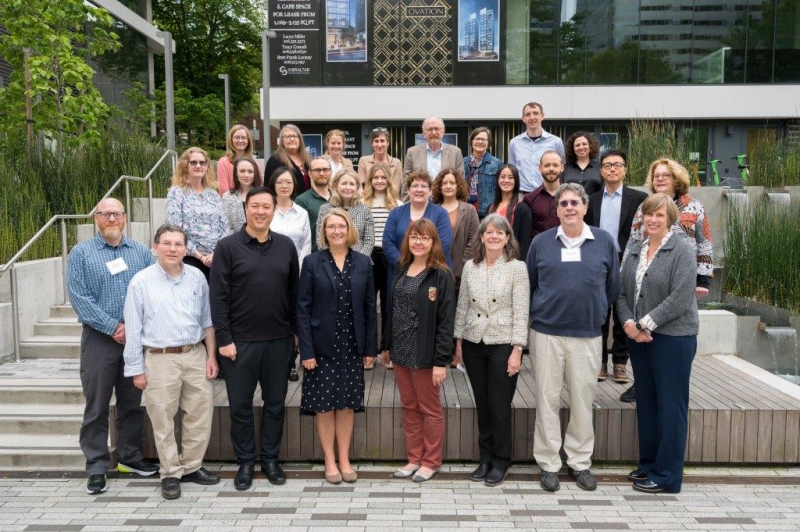Meet the 2023 EXACT-PLAN Award Recipients
The Office of Autoimmune Disease Research in the Office of Research on Women’s Health (OADR-ORWH), along with the National Institute of Arthritis and Musculoskeletal and Skin Diseases (NIAMS), is pleased to introduce the investigators who will be supported through the Notice of Special Interest (NOSI): EXposome in Autoimmune Disease Collaborating Teams PLANning (EXACT-PLAN) Awards. These awards represent a collaborative effort between OADR-ORWH, NIAMS, the National Institute of Environmental Health Sciences (NIEHS), and NIH Institutes, Centers, and Offices engaged in autoimmune disease research.
The EXACT Network, which is a national research collaborative team, conducts research to discover the environmental exposures that influence disease susceptibility, onset, and outcomes and will develop a systems-level approach to understand the mechanisms underlying how exposures perturb cellular, organ, and tissue function across autoimmune diseases. The R21 exploratory, developmental projects awarded through this NOSI are intended to enable institutions to plan research strategies and develop partnerships, infrastructure, and capabilities needed to address the major goals of the EXACT Network. The projects will also develop a research framework and strategies to support coordination among studies, collaborative research projects, and sites.
On May 23, 2024, researchers and personnel supporting the EXACT-PLAN Awards gathered in Seattle, Washington at the first EXACT-PLAN Summit. Summit participants learned about groundbreaking research from experts in autoimmunity and exposome science and engaged in discussions regarding approaches to integrating the exposome into autoimmune disease research.
2023 EXACT-PLAN Award Recipients

Dr. Buckner brings an interdisciplinary approach, genetics, immunology, and clinical medicine to the understanding of the causes of autoimmune diseases. Her research is focused on identifying the underlying mechanisms by which self-tolerance is lost in human autoimmune disease. The Buckner lab works on three areas of autoimmunity: (1) antigen-specific T cells in rheumatoid arthritis, (2) regulatory T cell-based therapy for type 1 diabetes and rheumatoid arthritis, and (3) the influence of alterations in cytokine signaling pathways on the development and progression of autoimmune disease. The diseases studied in the laboratory include type 1 diabetes, multiple sclerosis, rheumatoid arthritis, systemic lupus erythematosus, and relapsing polychondritis. The research goal is to expand the understanding of each disease by identifying the common features that cause them.
This work is aided by the Benaroya Research Institute Registry and Repository, which provides samples from well-characterized patients with autoimmunity and are available to scientists involved in the study of these diseases.
EXACT-Plan Title: Building Partnerships to Link the Exposome to Autoimmune Disease

Wilson Liao, M.D., is a professor, associate vice chair of research in dermatology, and director of the Psoriasis Center at the University of California San Francisco. He is a practicing dermatologist with expertise in inflammatory skin diseases and a human geneticist who has contributed to the identification of more than 75 psoriasis susceptibility genes. He has published more than 50 genetic, epigenetic, transcriptomic, proteomic, and microbiome studies of skin.
Dr. Liao’s group has investigated the impact of environmental factors on psoriasis, including diet, stress, season, exercise, sleep, meditation, viruses, skin injury, strep throat, and medications. Dr. Liao has led digital health initiatives and has developed SkinTracker, a mobile app enabling the conduct of remote dermatology trials. He currently serves as co-chair of the Group for Research and Assessment of Psoriasis and Psoriatic Arthritis (GRAPPA) Research Committee and is a member of the International Psoriasis Council and National Psoriasis Foundation Scientific Advisory Committee and Medical Board.
Dr. Liao is co-principal investigator of the Foundation for the National Institutes of Health Accelerating Medicines Partnership® Autoimmune and Immune-Mediated Diseases (FNIH AMP-AIM) Program in Psoriatic Disease, which is leveraging single cell and spatial profiling technologies to identify novel biomarkers of psoriatic disease flare and remission.
EXACT-Plan Title: Remote Exposome Monitoring for Skin Diseases Through Digital Health Devices and Home-Based Multiomics

Marc Natter, M.D., is a board-certified pediatric rheumatologist and expert in clinical informatics, who leads the Registries and Informatics Research & Development (R+I R&D) Group within the Computational Health Informatics Program (CHIP) at Boston Children’s Hospital. Dr. Natter’s research centers broadly on developing and applying advancements in clinical informatics and analytics to chronic diseases research, primarily in pediatric subspecialties such as pediatric rheumatology, and leveraging multi-source data to do so, including computable phenotyping. He serves as director of informatics for the Childhood Arthritis and Rheumatology Research Alliance (CARRA), the largest investigator-sponsored research network in pediatric rheumatology in North America, and is a founding investigator of the CARRA Registry, which has enrolled more than 13,000 participants at more than 70 sites internationally for collection of long-term follow-up data and bio-specimens.
For the currently awarded EXACT-PLAN project, Dr. Natter is leading collaborative efforts among CARRA network investigators and the NIH-funded Genomic Information Commons (GIC) network—a consortium of more than eight large pediatric centers with more than 13 million patients and 160,000 biospecimens—which will enable collection and integration of new, linked exposome-genome-phenotype data across both networks.

Jill Norris, Ph.D., M.P.H., received her M.P.H. and Ph.D. degrees in epidemiology in 1988 and 1990, respectively, from the University of Pittsburgh Graduate School of Public Health. She is professor and chair of the Department of Epidemiology in the Colorado School of Public Health. Dr. Norris’ research has focused on the relationship between genes and environment in the development of autoimmune diseases such as type 1 diabetes, celiac disease, rheumatoid arthritis, systemic lupus erythematosus, and multiple sclerosis.
She and her colleagues are following more than 2,400 children at risk for type 1 diabetes in the Colorado-based Diabetes Autoimmunity Study in the Young (DAISY), and more than 8,000 at-risk children in the international multicenter The Environmental Determinants of Diabetes in the Young (TEDDY) study. Dr. Norris and colleagues are also following more than 2,700 adults at risk for rheumatoid arthritis in the multicenter Studies of the Etiologies of Rheumatoid Arthritis (SERA), in which she is currently examining the role of inflammation resolution in the progression from autoimmunity to clinical rheumatoid arthritis. Her work is focused on investigating the role of maternal, infant, childhood, and adult dietary factors in the etiology of disease in at-risk populations using epidemiologic, metabolomic, genetic, and epigenetic approaches. She was a member of the 2022 National Academies of Sciences, Engineering, and Medicine Committee for the Assessment of NIH Research on Autoimmune Diseases.
Dr. Norris is an elected member of the American Epidemiological Society. She received the Noel Weiss and Tom Koepsell Excellence in Education Award from the Society for Epidemiologic Research, and the University of Pittsburgh Graduate School of Public Health Distinguished Alumni Award for Research.
EXACT-Plan Title: The Exposome in Rheumatoid Arthritis and Systemic Lupus Erythematosus: EXACT Network Planning

John Pearce, Ph.D., is an environmental health scientist who works to better understand the human health effects of complex environmental exposures. Previous research has focused on improving methods for integrating exposure monitoring, modeling, and characterization metrics into environmental epidemiology studies. These approaches have been applied in published studies of ambient air pollution, environmental chemical exposure, and neighborhood contextual factors. Long-term research goals include pioneering methodologies that will lead to breakthroughs in the understanding of links between complex environmental exposure and human health.
Early in his career, Dr. Pearce was supported by an NIH K99/R00 sponsored by the National Institute of Environmental Health Sciences and an Opportunities and Infrastructure Fund (OIF) for early investigators from the NIH Environmental Influences on Child Health Outcomes Program (ECHO) Program. Currently, Dr. Pearce is the principal investigator of a study focused on developing methods to improve toxicity assessment of environmental mixtures (EPA STAR R840460) and a study that seeks to enhance population cohorts that will advance the study of the exposome in autoimmune diseases (NIH R21AR084039).
EXACT-Plan Title: Enhancing the Improving Minority Health in Rheumatic Diseases (IMHRD) Cohort to Support Study of the Exposome in Autoimmune Disease

Brigitte Frohnert, M.D., Ph.D., is a clinician scientist, with a background in molecular biology and biochemistry, who is interested in the management of children identified early in diabetes progression and use of data to generate new insights into the disease processes. She received M.D. and Ph.D. degrees from the University of Minnesota. Her research interests lie in understanding the environmental factors that contribute to the development of islet autoimmunity and progression to type 1 diabetes, with the ultimate goal of preventing type 1 diabetes in the future.
In 2014, Dr. Frohnert joined investigators on two large epidemiologic studies: Diabetes Autoimmunity Study in the Young (DAISY) and The Environmental Determinants of Diabetes in the Young (TEDDY). DAISY is a cohort study based in Colorado that includes more than 2,500 high-risk children and young adults identified during infancy and followed for up to 17 years. TEDDY is a multi-center consortium with centers in Colorado, Washington, Georgia, Florida, Finland, Germany, and Sweden, following more than 8,500 children and collecting a wide array of data on dietary, infectious, and other exposures. Dr. Frohnert is currently an associate professor at the University of Colorado School of Medicine.
EXACT-Plan Title: Pediatric Autoimmune Consortium for Exposome Research (PACER)

